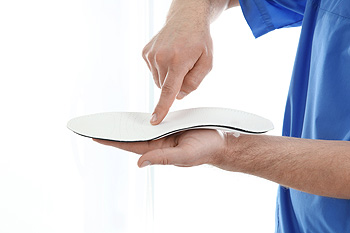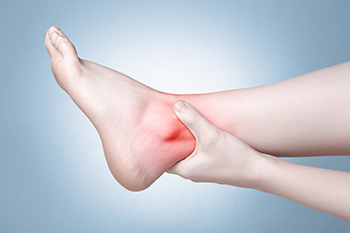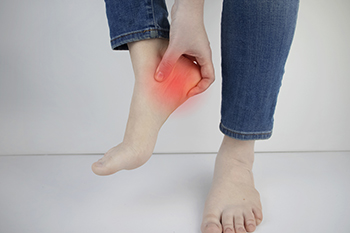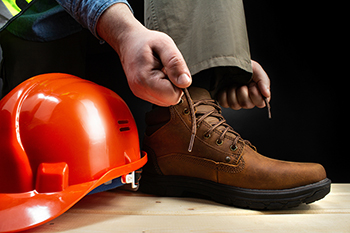






Many people familiar with podiatry might already know what orthotics are. These custom-made or over-the-counter foot devices are essentially shoe inserts. They can be used to correct foot deformities, facilitate healing, or simply provide extra support. Senior adults are a particular group of individuals that might especially benefit from the use of orthotic devices. The reason for this is simple. Ultimately, using certain orthotic devices as a senior can actually improve one’s sense of balance and stability. This can be very useful and beneficial concerning how dangerous suffering from falls can be for seniors. Balance-inducing orthotic devices can help seniors mitigate the effects of muscle weakness, joint instability, and gait abnormalities. If you are a senior or are caring for one, it is suggested that you schedule an appointment with a podiatrist today to discuss the potential benefits of orthotic devices.
If you are having discomfort in your feet and would like to try orthotics, contact one of our podiatrists from Active Foot and Ankle Care, LLC. Our doctors can provide the care you need to keep you pain-free and on your feet.
What Are Orthotics?
Orthotics are inserts you can place into your shoes to help with a variety of foot problems such as flat feet or foot pain. Orthotics provide relief and comfort for minor foot and heel pain but can’t correct serious biomechanical problems in your feet.
Over-the-Counter Inserts
Orthotics come in a wide variety of over-the-counter inserts that are used to treat foot pain, heel pain, and minor problems. For example, arch supports can be inserted into your shoes to help correct overarched or flat feet, while gel insoles are often used because they provide comfort and relief from foot and heel pain by alleviating pressure.
Prescription Orthotics
If over-the-counter inserts don’t work for you or if you have a more severe foot concern, it is possible to have your podiatrist prescribe custom orthotics. These high-quality inserts are designed to treat problems such as abnormal motion, plantar fasciitis, and severe forms of heel pain. They can even be used to help patients suffering from diabetes by treating foot ulcers and painful calluses and are usually molded to your feet individually, which allows them to provide full support and comfort.
If you are experiencing minor to severe foot or heel pain, it’s recommended to speak with your podiatrist about the possibilities of using orthotics. A podiatrist can determine which type of orthotic is right for you and allow you to take the first steps towards being pain-free.
If you have any questions please contact our offices located in Fair Lawn, Riverdale, and Englewood, NJ . We offer the newest diagnostic and treatment technologies for all your foot and ankle needs.

Peroneal tendonitis is inflammation of the tendons that connect your leg to your foot. These tendons run along the outside of the ankle bone and foot. Peroneal tendonitis is an overuse injury, but it can also be caused by a fall or other trauma to your foot. Symptoms include pain along the outside of the foot and ankle that increases with activity. Swelling, redness, and warmth may also develop. Peroneal tendonitis generally starts with tears in the tissue, but if ignored can develop into a rupture. Because this injury exhibits traits commonly attributed to other ankle pain, it can be difficult to diagnose. A visit to a podiatrist is suggested, where the foot doctor can perform a series of tests to determine the cause. Treatment, which may take a month or more, includes taking non-steroidal anti-inflammatory medication, wearing a protective brace or soft cast, and performing certain exercises. In severe cases, surgery to clean out the damaged tissue is required. For more information, it is suggested that you make an appointment with a podiatrist.
Ankle pain can have many different causes and the pain may potentially be serious. If you have ankle pain, consult with one of our podiatrists from Active Foot and Ankle Care, LLC. Our doctors will assess your condition and provide you with quality foot and ankle treatment.
Ankle pain is any condition that causes pain in the ankle. Due to the fact that the ankle consists of tendons, muscles, bones, and ligaments, ankle pain can come from a number of different conditions.
Causes
The most common causes of ankle pain include:
Symptoms
Symptoms of ankle injury vary based upon the condition. Pain may include general pain and discomfort, swelling, aching, redness, bruising, burning or stabbing sensations, and/or loss of sensation.
Diagnosis
Due to the wide variety of potential causes of ankle pain, podiatrists will utilize a number of different methods to properly diagnose ankle pain. This can include asking for personal and family medical histories and of any recent injuries. Further diagnosis may include sensation tests, a physical examination, and potentially x-rays or other imaging tests.
Treatment
Just as the range of causes varies widely, so do treatments. Some more common treatments are rest, ice packs, keeping pressure off the foot, orthotics and braces, medication for inflammation and pain, and surgery.
If you have any questions, please feel free to contact our offices located in Fair Lawn, Riverdale, and Englewood, NJ . We offer the newest diagnostic and treatment technologies for all your foot care needs.

The condition that is known as plantar fasciitis affects the heel and arch of the foot. There is a band of tissue called the plantar fascia, which connects the heels to the toes. It is found on the sole of the foot, and it can become inflamed or torn for various reasons. These reasons can include wearing shoes that do not fit correctly, or standing on hard surfaces for most of the day. People who are overweight may be prone to getting plantar fasciitis, which may be a result of having the added weight the feet must bear. The pain may be worse in the morning when awakening, and may start to feel better when the foot is moved. Mild relief may be found when custom-made insoles are worn in the shoe, and the foot is frequently elevated. There are specific stretches that can be done, which may help to ease the discomfort from plantar fasciitis. The heel can be stretched by standing on a step while lowering one heel at a time until a gentle pull is felt. If you are afflicted with this condition, it is suggested that you confer with a podiatrist who can provide you with permanent relief options.
Plantar fasciitis is a common foot condition that is often caused by a strain injury. If you are experiencing heel pain or symptoms of plantar fasciitis, contact one of our podiatrists from Active Foot and Ankle Care, LLC. Our doctors can provide the care you need to keep you pain-free and on your feet.
What Is Plantar Fasciitis?
Plantar fasciitis is one of the most common causes of heel pain. The plantar fascia is a ligament that connects your heel to the front of your foot. When this ligament becomes inflamed, plantar fasciitis is the result. If you have plantar fasciitis you will have a stabbing pain that usually occurs with your first steps in the morning. As the day progresses and you walk around more, this pain will start to disappear, but it will return after long periods of standing or sitting.
What Causes Plantar Fasciitis?
There are some risk factors that may make you more likely to develop plantar fasciitis compared to others. The condition most commonly affects adults between the ages of 40 and 60. It also tends to affect people who are obese because the extra pounds result in extra stress being placed on the plantar fascia.
Prevention
There are a variety of treatment options available for plantar fasciitis along with the pain that accompanies it. Additionally, physical therapy is a very important component in the treatment process. It is important that you meet with your podiatrist to determine which treatment option is best for you.
If you have any questions, please feel free to contact our offices located in Fair Lawn, Riverdale, and Englewood, NJ . We offer the newest diagnostic and treatment technologies for all your foot care needs.

Many professions require standing during the work day, and there are specific types of shoes that can help to protect the feet. It is beneficial to choose shoes that are specific for the job that is done, and these may range from having steel toes to being chemical resistant. Shoes referred to as safety-toe shoes have protection that can protect the feet during a crushing episode, possibly avoiding severe pain and discomfort. Some shoes are designed to protect the toes and may be categorized as special protective footwear. Various jobs require different types of shoes to be worn. People who perform lab work may benefit from wearing chemical-resistant boots. Electrical workers may wear waterproof shoes, and people who work with large animals may opt to wear shoes with extra toe protection. If you would like additional information about what type of work shoes to purchase, it is suggested that you confer with a podiatrist who can address any concerns you may have.
While working on the feet, it is important to take the proper care of them. For more information about working on your feet, contact one of our podiatrists from Active Foot and Ankle Care, LLC. Our doctors will treat your foot and ankle needs.
Working on Your Feet
Standing on your feet for long periods of time can cause stress and pain in your feet. Your whole body may experience change in terms of posture, back pain, bunions, callouses and or plantar warts. There are ways to avoid these conditions with proper foot care, smart choices and correct posture.
Positive Changes
Negative heeled shoe – Choosing this shoe type places the heel slightly lower than the ball of the foot. These are great for overall foot health. Find shoes that fit you correctly.
Go barefoot – Our feet were not designed to be enclosed for all hours of the day. Try to periodically expose your feet to air.
Eliminate Pain
Foot Exercises – Performing simple exercises, incorporating yoga and doing stretches are beneficial. This will allow increased blood flow to the area and muscles of the foot.
Achilles tendon – Stretching the foot out flat on the floor will relax the calf muscles and tendon. These exercises can be performed almost anywhere. Make sure you add these exercises to your daily regimen.
With a little bit of this information and knowing more about foot health, you will notice changes. Foot stretches and proper footwear will help with pain and prevent further issues.
If you have any questions please feel free to contact our offices located in Fair Lawn, Riverdale, and Englewood, NJ . We offer the newest diagnostic and treatment technologies for all your foot and ankle needs.






